Commissioning of the IACPOS system in Beceite
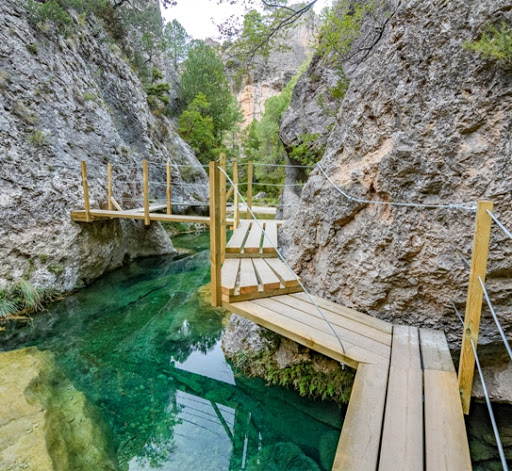
Commissioning of the IACPOS system in Beceite Beceite The beautiful town of Beceite is located in the most prominent mountain range in the northeast of the province of Teruel. The Matarraña, Ulldemó, Algás and Pena rivers rise and flow in it, together with immense forests that make up mountainous landscapes of great beauty and that are home to one of the most varied and best preserved ecosystems in Europe. Beceite and water are also intimately linked in the urban area, bathed by the Matarraña River, which rises in Beceite and forms several pools or ‘tolls’ of impressive beauty. Also, several ditches, branches and brazales cross the streets of the town which gives a greater charm to the town. In fact, its urban area has been declared an asset of cultural interest. In order to enjoy this idyllic setting, on the one hand, a beautiful route with footbridges, called El Parrizal, is offered, with the possibility of being able to marvel at spectacular views between mountains, and crystal clear waters full of life. And on the other hand, the possibility of being able to bathe in pools of water located in the riverbed. It is the Pequera Natural Area. System Implementation With the current pandemic situation, the town had a severe problem of influx and lack of control in terms of the volume of public interested in enjoying the two environments. The agglomeration of visitors, together with the previous traffic jam on the road at the entrances, caused the need for a real and prior control of the visitor. In this way, the City Council, with good judgment, wanted to regulate the influx of mornings and afternoons to both destinations, as well as trying to ensure that visitors could make an appointment in advance, and thus avoid traveling to the town and then not being able to access the Natural spaces. All this, in addition, organized with the hotels in the area. To do this, IACPOS came up with the control solution, gauging the mornings and afternoons with a limited number of visitors, controlling license plates in the parking access areas, and serving the City Council, with a reservation and ticket sales website https:/ /entradasbeceite.arteyocio.com/, with which the interested party obtains a ticket in advance and thus has the certainty that they will be able to access the spaces without problems. And it is that in the midst of the pandemic crisis, Beceite has been able to update itself and provide security to its visitors, modernizing its website with our ticketing system. In these new times that we are living with the arrival of the coronavirus, technology can also be linked to nature. Here is a clear example.
IACPOS helps in the digital transformation of the museums of the City of Malaga
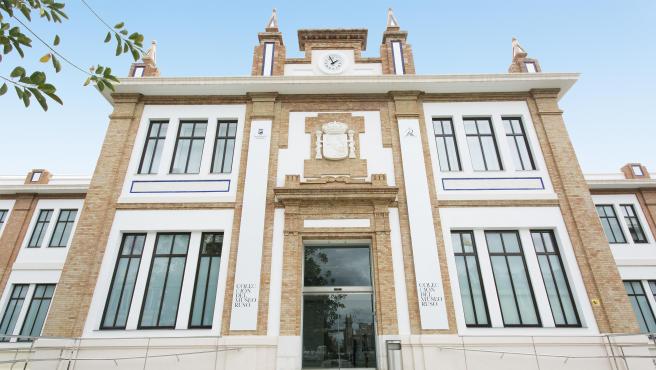
IACPOS helps in the digital transformation of the museums of the City of Malaga Yesterday morning our colleagues from 20 minutes echoed the news of the implementation of the IACPOS system in the publicly owned museums of the city of Malaga that we announced last August. From our company, we also want to thank the collaboration throughout the process with EULEN Art, who, together with its director, Carmen Olivié, has always been present in the implementation of our solution. In the words of Olivié, the IACPOS solution has made it possible to effectively control the capacity, which favors the quality of the visit and complete traceability in the management of ticket sales and reservations, access control and management of the capacity of the precincts”. Undoubtedly, all the players in the sector firmly believe that the epidemiological crisis that is plaguing the world does nothing but accelerate the digital transformation of museums and leisure centers, as well as the implementation of a new culture in the way we interact with technology and we use it. In addition, this technology helps in the prevention, containment and spread of the pandemic. There have been many museums that have signed up for the existing online ticket sales systems, introducing this pre-booking web format to control their capacity and capacity in the different spaces, as well as to further promote a contactless service.
IACPOS continues to expand the ticket sales and collection service at the Alhambra in Granada
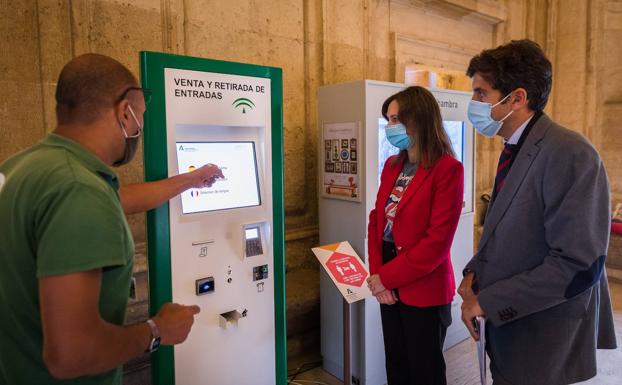
IACPOS continues to expand the ticket sales and collection service at the Alhambra in Granada The Board of Trustees of the Alhambra and Generalife continues to strengthen its ticketing service in collaboration with IACPOS and has installed a TVR vending machine in the entrance hall of the Palacio de Carlos V. For the company it is a privilege to continue improving the service and visitor experience in one of the most important national and international monumental complexes. In the words of the director of the Board of Trustees of the Alhambra and Generalife, Rocío Díaz, this will make it easier for individuals and companies to sell and collect tickets without discount, and thus reinforce visitor attention in the entrance area to the Nasrid Palaces. This new vending machine is added to the TVR devices installed in the ticket offices of the Monumental Complex of the Alhambra and the Generalife and in the Information and Visitor Services Office of the Estafeta building. In the Atrium area, next to the monument’s ticket offices, a new information support has also been placed with more accessible tools that allow people with hearing, visual or physical disabilities to access useful information about the monument, such as opening hours, with greater autonomy. , itineraries, prices or types of visits, and thus improve the quality of your visit. Information available in sign language and subtitles in Spanish and English, which can also be consulted on the website of the Board, www.alhambra-patronato.es As always, the objective is none other than to provide visitors with the best experience and accompany them before, during and after the visit, thus providing a comprehensive service that accompanies them throughout the entire tour.
IACPOS incorporates a new access system to the Alhambra in Granada
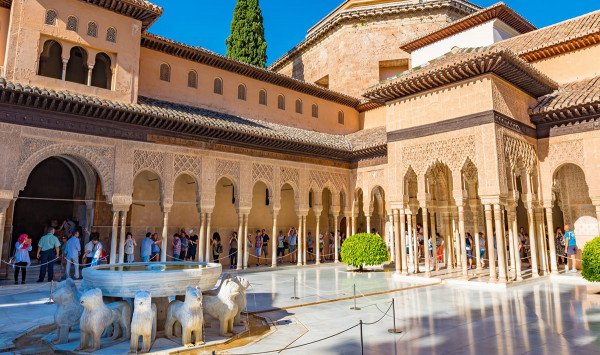
IACPOS incorporates a new access system to the Alhambra in Granada The Board of Trustees of the Alhambra and Generalife has implemented an innovative access system that improves the security and transparency of the Granada monument, and allows visitors to access by reading the original ID or passport. This important milestone, promoted by IACPOS, improves security at the entrances to the Alhambra with a new image recognition system, thanks to a new technological tool called ‘OCR’ (Optical Character Recognition), certifying the veracity and identity of the visitor , since it allows the optical recognition of the encrypted content in an image, so in a matter of seconds it identifies the symbols and characters of the DNI or passport and checks if they are the same as those provided by the visitor when buying the ticket . The system has been installed at all access points to the Monumental Complex and will soon be implemented in the Andalusian monuments attached to the Alhambra, it is a clear example of the commitment of the Board of Trustees of the Alhambra and Generalife to guarantee a more efficient and safe management in the access and control of visitors, and provide greater transparency throughout the ticket sales procedure. At IACPOS we continue to add value to all our clients as well as firmly committed to the digitization of some of the most important monuments and tourist attractions on the national and international scene. In the words of the Minister of Culture and Historical Heritage, Patricia del Pozo: “this system speeds up the entire process of control and entry of visitors to the Monumental Complex of the Alhambra and the Generalife, facilitating their flow and making their visit safer ”. We leave you the video, where the Board of Trustees of the Alhambra and Generalife explains the whole process: https://www.facebook.com/alhambracultura/videos/vb.161221555640/241937937060844/?type=2&theater
IACPOS present at the IAAPA Virtual Conference: The Americas

IACPOS present at the IAAPA Virtual Conference: The Americas On September 2 and 3, we were lucky enough to be able to attend the first IAAPA Virtual Conference: The Americas, where the teams from IAAPA North America and IAAPA Latin America and the Caribbean were present. As the global attractions industry moves together, IAAPA created this online event to keep members connecting, learning and growing. During this two-day program, we had the opportunity to learn from industry leaders from around the world as well as gain and share key insights on generating business ideas, creating a culture of innovation, and much more. In addition, throughout these days we were able to develop and establish relationships with various personalities and important entities in the sector in the different colloquiums, “coffee rooms” and “happy hour”. In these two days we were able to listen to the opinion of our colleagues on topics such as: cybersecurity, cashless operations, emerging trends, the new way of providing good customer service, motivating the workforce, thinking in a disruptive way, transformation of small attractions, etc. Full stop deserves D. Paul Pei’s exposition about how buying and selling is something emotional and his way of transmitting the message in a new and impressive way. Thanks to the platform provided by IAAPA to attend these conferences, we were able to exchange ideas during the sessions in an interactive way, have a fun time through small games, give feedback through different surveys and share our ideas through networks social networks with the hashtag #VirtualAmericas. Also thank John Hallenbeck (IAAPA North America) and Paulina Reyes (IAAPA Latin America) as executive directors for organizing the event and the rest of the speakers: Christine Buhr, Mike Abecassis, David McKillips, Shaun McKeogh, Matt Heller, Teresa Cardenas, Linda Freeman , Felipe Arteaga, Kevin McNulty, Jim Pattison Jr., Greg Hale, Leslie DaCruz, Ted Molter, Amanda Thompson as well as the “master of ceremonies”, Valeria Cañón.
New implementation of the solution in three Malaga Museums: Pompidou, Ruso and Casa Picasso
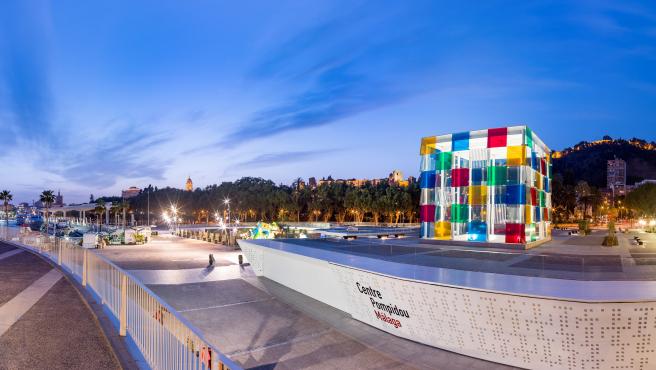
New implementation of the solution in three Malaga Museums: Pompidou, Ruso and Casa Picasso Currently, the Malaga Public Agency manages the Pablo Ruiz Picasso Birthplace Museum, the Center Pompidou in Malaga and the Collection of the Russian Museum, Saint Petersburg/Málaga. The Pablo Ruiz Picasso Birthplace Museum was born under the name of the Pablo Ruiz Picasso Foundation on February 26, 1988, with the aim of studying and promoting the work and figure of the artist. The Pompidou Center of Malaga was created in 1992 establishing programs of live shows, cinema and meetings, such as debates, meetings and conferences. The merger of the National Museum of Modern Art and the Creation Center allowed the creation of an architecture and design collection, which has become one of the most relevant in the world. As for the Russian Museum of Malaga, the first headquarters in Western Europe of the Russian State Museum is established in the city, as one of the great milestones of the cultural offer that gives the city a prominent place on the international art scene. Inaugurated in 2015, this space houses a series of long-term exhibitions, renewed each year, that cover the complex and fascinating history of Russian art and its changing relationship with European culture, as well as offering successive and outstanding temporary exhibitions that complete the discourse expository. All of them make up one of the main destinations in Malaga to create exceptional experiences of art, leisure and entertainment. The three museums have relied on IACPOS to manage the entire ticket sales service, working side by side in the midst of the crisis, with the current services company EULEN, allowing greater functionality to the centers, and providing a consistent ticket sales solution at the box office and online, with capabilities that are perfectly suited to the Museums’ goals, to provide exceptional customer service. A clear example is the possibility of combined tickets between the three museums. IACPOS has helped improve online shopping, through an intuitive checkout process, alleviating demand on box office staff and increasing customer satisfaction. Another significant benefit of the solution is controllability. Access is regulated by mobile readers, by reading the QR of the ticket, pdf or mobile, which also means added statistical information regarding sales/access to venues, through the IACPOS back office system. This statistical system is also fed by sales from third-party companies, tracking the redemption at the box office, with the consequent follow-up of the same and providing dynamic information on the operations, replacing the tedious manual process. At IACPOS we continue to work creatively hand in hand with our clients to use new solutions in an innovative way, to satisfy the needs of both the Museum and the visitor.
IACPOS collaborates with IAAPA in information days about the reopening of Leisure Centers

IACPOS collaborates with IAAPA in information days about the reopening of Leisure Centers The International Association of Amusement Parks and Attractions (IAAPA), represents more than 6,000 members of the amusement industry in more than 100 countries worldwide and operates several world attractions trade shows. Founded in 1918, it has been headquartered in Orlando, Florida for more than a century, becoming the main organizer of global events in the attractions industry and the facilitator of market connections. IACPOS, as a member of IAAPA, has been participating for years in the fairs that take place in the United States. At the request of IAAPA, as well as a great coordination between the different work teams that were created, it was an honor to be able to participate as exhibitors in one of the days through a series of webinars and Facebook Live to help the different members of IAAPA in Latin America, to reorient their processes, innovate and prepare for a reopening that allows them to operate in this new reality. The theme of the presentation was: De-escalation for reopening, sales and access to attractions, experience of a European museum. In addition, we had the opportunity to have one of our clients whom we would like to thank for their presence, the Prado Museum, who, together with the Head of the Visitor Service Area, showed all the attendees how the reopening of one of the quintessential European museums. Los ponentes fueron: Noelia Ibáñez Pérez, Jefa del Área de Atención al Visitante, Museo Del Prado Santiago Castillón Pueyo, CEO, IACPOS. Carlos Mondragón, Director de Innovación, El Gabinete During the day we had 94 attendees, from 12 countries, mostly from Mexico (41) and Colombia (21). The feedback from all attendees was excellent, receiving thanks and congratulations from the various representatives of the attractions industry. Without a doubt, we want to value the usefulness of these conferences even more so in current times, where digital media and digitization have acquired a predominant role and thank IAAPA for the dissemination and the great work they do in this area, especially Paulina Reyes, Vice President and Executive Director, as well as Roberto Becerra, Education Manager. At IACPOS we continue to work hard, providing high added value solutions to all our clients as well as incorporating new clients that we will soon inform about those who we can help with our solution and experience in these times of “new normality”.
Interview with the Palacio de Viana: “COVID-19 has influenced the digital transformation of museums”
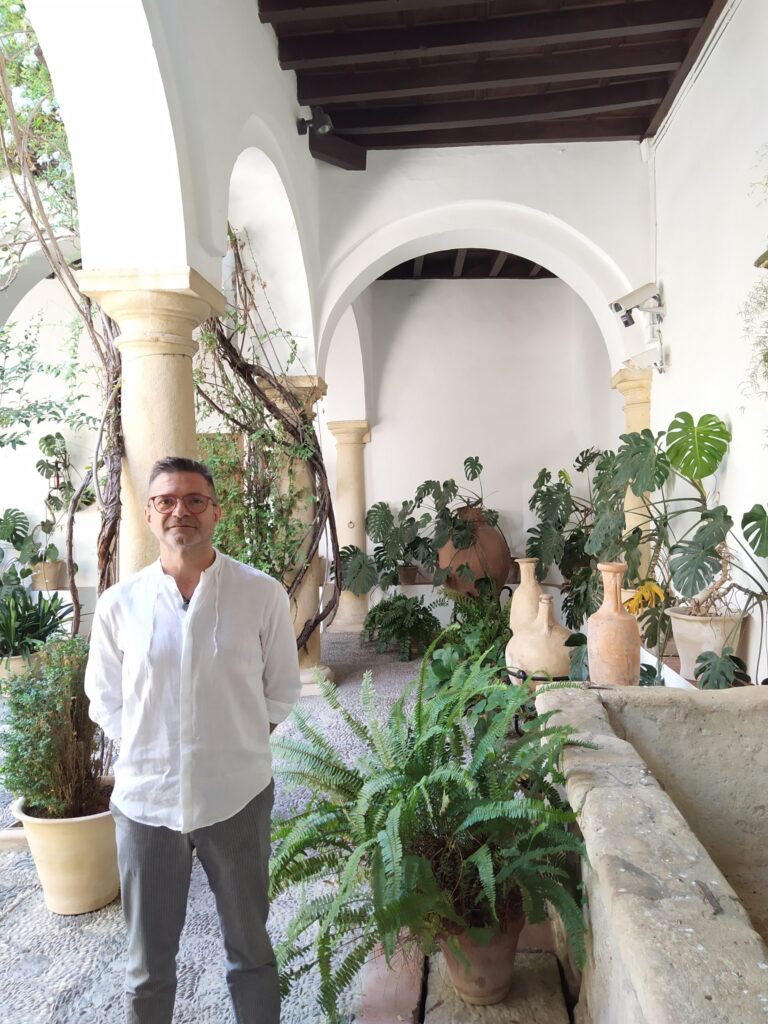
Interview with the Palacio de Viana: “COVID-19 has influenced the digital transformation of museums” Avelino Cazallo González is the Diffusion Director and Cultural Programmer of the Palacio de Viana (Córdoba), one of the main tourist attractions in Córdoba, declared a National Artistic Historic Monument and Artistic Garden. The singularity conferred by its 12 courtyards makes it known as the Museum of the Courtyards. We wanted to talk to Avelino about the return to normality of the museum, after being forced to close as a result of the coronavirus health crisis and the declaration of the state of alarm, the adoption of the pertinent mandatory hygienic-sanitary measures and its new IACPOS Ticket Sales system, introducing the advance reservation web system to control its capacity and capacity in the different spaces, as well as control at the point of sale for group assignment and guidance. How was the outbreak of coronavirus (COVID-19) received by the Palacio de Viana and what measures were taken? The outbreak of coronavirus in the Palacio de Viana was like a jug of cold water, since on March 13 we decided not to open it to the public anymore and it caught us at the time of maximum influx and greatest splendor of the Palace, since spring was beginning which is the time of greatest flowering of botanical species. However, although the severity of the pandemic was anticipated, at no time did we think that the confinement would last so long. It was during the development of this one that we faced the reality that was coming. We began to give up our high season, since during the months of March, April and May we receive approximately 40% of the visitors that we have throughout the year. From the beginning of the closure to the public, the decision made by the Management was to take advantage of this parenthesis to carry out maintenance, restoration and conservation tasks throughout the enclosure specified in the Museological Plan by which the Palacio de Viana is governed and which still could not be addressed. In the same way, the maintenance of all the botanical species that make up the patios and their sanitation, which had been carried out very discreetly until now to maintain the floral exuberance in them. The consumption of culture in times of coronavirus has increased. More internet and social networks have been used, more radio and music have been listened to, more newspapers have been read, more books… and even museums have opted for digital exhibitions, live tours, content on Instagram and Facebook. How have you seen the creativity of adaptation of museums and visitors in this period? It is true that, fortunately, there has been an increase in the consumption of culture through new technologies and this has made it possible to reach a larger audience. But in my opinion, it has been more a work of dissemination or communication of the Culture centers than of directly accessing it, since I think that this is one of the pending subjects on the part of the Culture centers, knowing how to transmit the content cultural; on the part of the visitors, being able to receive it as such and not as mere information about what is in said centers. I believe that until now, although several institutions have tried, it has not been possible to directly reach the visitor’s soul through technology. In particular, I don’t know anyone and it doesn’t mean that there isn’t, who considers that he has visited the Prado Museum and knows his works without having been physically there, even if he is a faithful follower of the broadcasts they do on Instagram, to put a example. After confinement, how are visitors receiving the return of the museums? After confinement, the reopening has been very well received by the local public, who have been the ones who have been able to enjoy the facilities in principle. The new regulations imposed for the prevention of COVID-19 (use of masks, hand hygiene, social distance) have been respected by visitors, with social distancing being the most difficult thing, which is what has been least internalized, perhaps also because of our idiosyncrasy and way of life. How have the preparations for the new normality been experienced from a museum? What protection measures are being taken in spaces such as the Palacio de Viana? The preparations for the new normality have been complicated, especially due to the uncertainty, the lack of specificity in different aspects regarding the regulations on visits to tourist monuments that, as in our case, have different visits: an unattended visit through the 12 patios and the garden, the stables and the institutional area of the Palace, and another visit that is guided on the tour of the upper floor of the Palace where the rooms and the great collections that the family treasured are known. The latter is not yet being carried out since we are studying how to develop them, offering the maximum guarantees of health security both for the staff who make these guided tours and for visitors interested in discovering the wealth that the Palace treasures. Regarding the protection measures taken, it is mandatory to access the use of the mask, the disinfection of footwear at the entrance using a virucidal disinfectant mat, hand hygiene, with a hydroalcoholic gel dispenser at the reception and the recommendation and surveillance to maintain social distance, in addition to having established a maximum capacity in each of the patios. In the case of the Palacio de Viana, IACPOS has also been implemented as a ticket sales and capacity control system. How is it helping you? Regarding the implementation of IACPOS as a ticket sales and capacity control system, it is of great help when it comes to being able to access
The Palacio de Viana launches its new ticket sales system
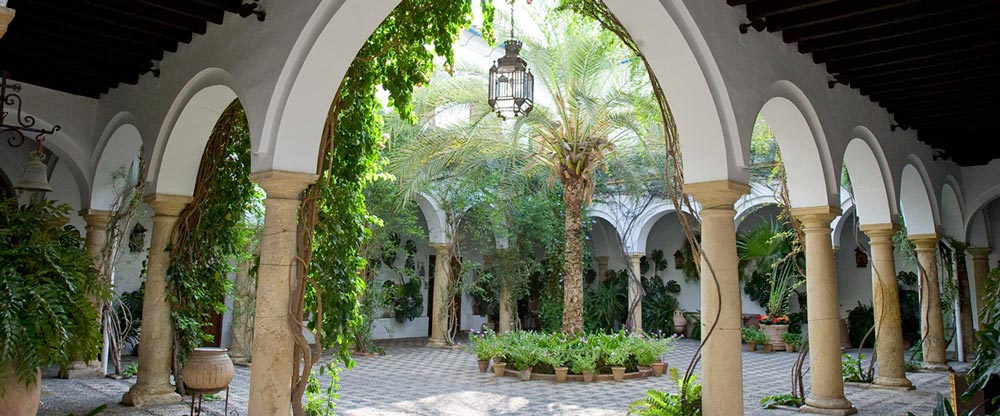
The Palacio de Viana launches its new ticket sales system The Palacio de Viana, declared a National Historic-Artistic Monument and an Artistic Garden, is one of the main tourist attractions in Córdoba. The singularity conferred by its 12 courtyards makes it known as the Museum of the Courtyards. The Cordovan patio, heir to the Roman and Arab tradition, has its widest historical representation in Viana. In recent years the influx to this monument has been increasing, reaching a figure around 150,000 annual visitors. History Five centuries of history make up Viana. Five centuries where the patios have always been the protagonists of this building that has been growing almost organically, as a result of extensions and reforms over time. A living house inhabited until the end of the 20th century by noble families and, however, with a great popular taste. The history of the Palace dates back to the 14th century. It is believed that the main façade was designed by Juan de Ochoa in the 16th century and that in subsequent years numerous extensions were added to the palace, giving rise to the irregular silver that it presents today. Throughout its five centuries of history, the palace has passed through the hands of 18 noble families. Among its owners are the Marqueses de Villaseca and the Marqueses de Viana, who lived there until the property was sold in 1980 to Cajasur, the current owner of the Palacio de Viana. The courtyards of the Palace of Viana The main attraction of the Palacio de Viana is its twelve patios, which make up the most important collection of Cordovan patios in the Caliphal city. These outdoor spaces bring together the essence of Roman and Arabic architecture so characteristic of Córdoba. The twelve patios are linked by galleries and house a wide variety of aromatic plants, citrus trees and fountains. Visiting the courtyards of the Palacio de Viana is a perfect opportunity to discover the importance of vegetation and water in the medieval houses of Córdoba. New ticket sales system The Palacio de Viana has just launched its new ticket sales system in May, hand in hand with IACPOS. We are pleased to report this important milestone and it is an honor for us to serve another of the significant monuments of our country. From now on, all those who wish can purchase their tickets in advance at: https://tickets.palaciodeviana.com In the midst of the pandemic crisis, the Center has been able to update and modernize its ticketing system, introducing the advance reservation web system to control its capacity and capacity in the different spaces, as well as control at the point of sale for assigning groups and guided. Undoubtedly, these new times that we are all living with the arrival of the coronavirus in our day to day is signifying a growing (even greater) commitment to technology and the digitization of all leisure and cultural centers.
Ticketing sector facing the coronavirus crisis
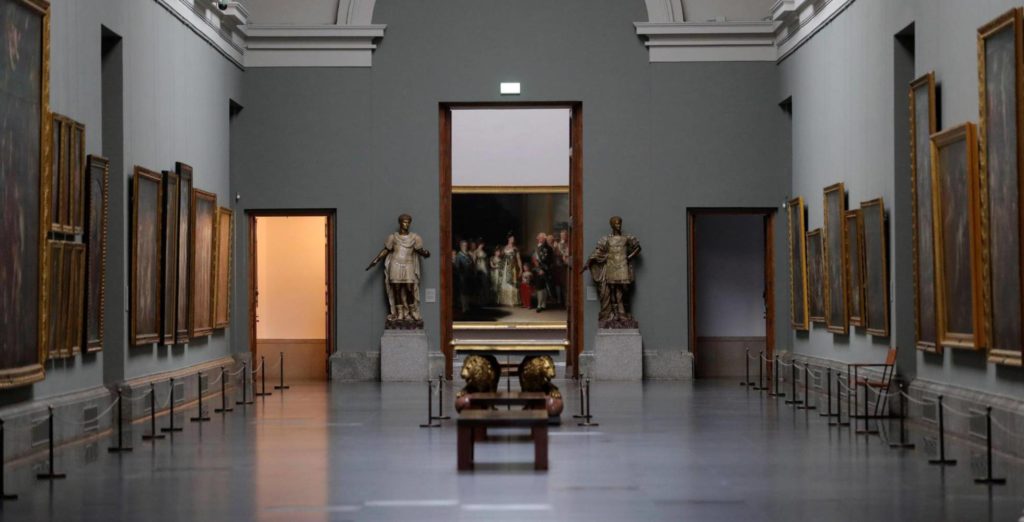
Ticketing sector facing the coronavirus crisis Due to the global health emergency, the leisure and tourism sector is undoubtedly one of the most affected by this COVID crisis. We know that the paralysis of the sector, as well as the enormous decrease in the number of visitors that is to come when the Leisure Centers are reopened, is affecting, and will affect, many of our clients, who are going to have to readapt to a new situation. All of this will be temporary, and everything will return to normal in a short space of time. And the client knows that and is already preparing. In fact, a change in consumption habits is being detected, where the offline channel is having a really bad time, and E-Commerce is growing in many sectors. In our sector, this is not going to be any different, and advance reservations or sales are going to become very important, as well as the reduction in capacity, all of which is much more controllable thanks to the Marketplace or E-Commerce. In this line, different studies confirm that the Spanish are willing to carry out activities that have to do with leisure, since it is in the first categories of “revenue spending” (expenditure that we want to do when the crisis ends). For this, at IACPOS we are adapting to the situation, with our team working daily, coordinating with our clients to constantly update and help in this situation, as we have always done. Important fact is that we continue to expand the market, and we continue to close agreements, in which in many cases, the importance of the aforementioned online part becomes extremely important. Right now union and teamwork are more important than ever. In fact, IACPOS treats this new great threat in the form of viruses as a great opportunity to improve. Times of uncertainty? Yes, but it is also time to adapt and reinvent ourselves. It is something that at IACPOS has made us stronger. On behalf of the entire IACPOS team, much encouragement to all our clients as well as to the entire industry.
